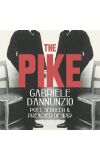
22 Feb 2013 19:07:34
Reaching Trieste, they came under fire. Miraglia brought the plane in low over the marina. D'Annunzio dropped bombs on the Austrian submarines and pamphlets (he'd written them himself) into the piazzas. Turning back, they realised one of the bombs had got stuck. "See if you can push it so it falls out," Miraglia wrote in d'Annunzio's notebook. "But don't twist it." He must have managed it somehow, because they landed safely back in Venice. D'Annunzio "had embarked on his new life as national hero", Lucy Hughes-Hallett writes in her enthralling new biography of the "poet, seducer and preacher of war".
He was born in Abruzzo in 1863. His father, a landowner and wine merchant, was the mayor of Pescara, on the Adriatic coast. At the age of 11 d'Annunzio was sent to boarding school in Prato, 400 kilometres away across the Apennines. His first book of poems, Primo Vere, was published when he was 16, at his father's expense. It was well reviewed in the influential cultural weekly Fanfulla della Domenica. Just before an expanded second edition came out the following year, a newspaper editor in Florence received an anonymous postcard from Pescara saying that d'Annunzio had fallen off his horse and died. The news, reported in papers all over Italy, wasn't even remotely true: d'Annunzio – already displaying not only his precocious talents as a writer but also his gift for self-promotion – had sent the postcard himself.
After that, there was no stopping him. Soon enough he was in Rome, writing prolifically – poetry, journalism, short stories; spending prodigiously – however little or however much he was earning, he always lived way beyond his means, with a fatal weakness for lavish interior décor; and sexual promiscuity. The pattern for his life was set. For the next 20 years he would punctuate his otherwise non-stop thrill-seeking – horse-riding, fox-hunting, motoring, flying, and endless, endless sex – with periods of withdrawal for writing. He wrote the first of his seven novels, Pleasure, in five months in 1888, shut away in a friend's house in Abruzzo. The hero, Andrea Sperelli, is a worldweary young libertine about Rome. Henry James admired its "splendid visual sense" and "ample and exquisite style" (one of the reasons it seems rather dated now). It also sold fantastically well, transforming d'Annunzio into an international celebrity.
A problem for a biographer is that d'Annunzio's personal appeal seems to have lain largely in his voice and in his sexual prowess, which makes it difficult to convey on the page. His insatiable sexual appetite left a trail of ruined women, variously disowned by their fathers, abandoned by their husbands and committed to insane asylums. His superhuman selfishness, his foaming nationalist rhetoric about soaking the earth with blood: they're clear enough. But we simply have to take everyone's word for it that he was irresistibly attractive (well, not quite everyone's: Hemingway thought he was a "jerk", and the courtesan Liane de Pougy called him "a frightful gnome with red-rimmed eyes and no eyelashes, no hair, greenish teeth, bad breath and the manners of a mountebank"). One of the best descriptions of d'Annunzio's mesmerising voice comes from the teenage daughter of the composer Pietro Mascagni: "When Signor d'Annunzio speaks, it always seems as though he is telling one a secret. Even if he is only saying good morning." She met him in Paris, where he'd fled in 1910, no longer able to evade his creditors in Italy.
He returned home in triumph in May 1915, invited to speak at the unveiling of a monument to Garibaldi in Quarto, near Genoa. He turned his magical voice on the vast crowds that gathered to greet him – 100,000 of them, according to the Corriere della Sera, when he reached Rome on 12 May – calling for Italy to enter the war and complete the unification of the country by annexing great swathes of the Austro-Hungarian Empire. On 23 May, Italy declared war on Austria-Hungary – though, as it happened, the decision had been irrevocably made while d'Annunzio was still in France.
The mass slaughter and three-year stalemate in the Dolomites did nothing to dim d'Annunzio's enthusiasm for war. He lost many friends, including Miraglia, and was permanently blinded in one eye when a plane he was in was shot down. But after the armistice he wrote: "I smell the stench of peace." And the war for d'Annunzio wasn't over: in September 1919 he led an army of irregulars and mutineers into the disputed city of Fiume (now Rijeka in Croatia) and set himself up as dictator. For 15 months he reigned as Duce, until the Italian navy bombed him out.
In February 1921 he moved into the house above Lake Garda where he would live in semi-seclusion until his death in 1938, dedicating himself to the delights of cocaine, coitus and interior design. His retirement was largely funded by the fascist government, who were keen to keep him quiet and out of the way. Mussolini wanted to promote d'Annunzio as the John the Baptist of fascism, which was easier to do if the man himself, who didn't see things that way, wasn't around to argue.
"Though d'Annunzio was not a fascist," Hughes-Hallett observes, "fascism was d'Annunzian." In 1892 he had written that "men will be divided into two races. To the superior ones, who have raised themselves by the pure energy of their will, everything will be permitted, to the inferior ones nothing, or very little." Admiring some of the work, and insisting on looking at d'Annunzio in context, Hughes-Hallett does her best to withhold judgment on the life: she is, she says, "a woman writing about a self-styled 'poet of virility' and a pacifist writing about a warmonger, but disapproval is not an interesting response". Having said that, she calls him "appalling" on several occasions. As indeed in many ways he was. Disapproval may not always be interesting, but sometimes it's unavoidable.

